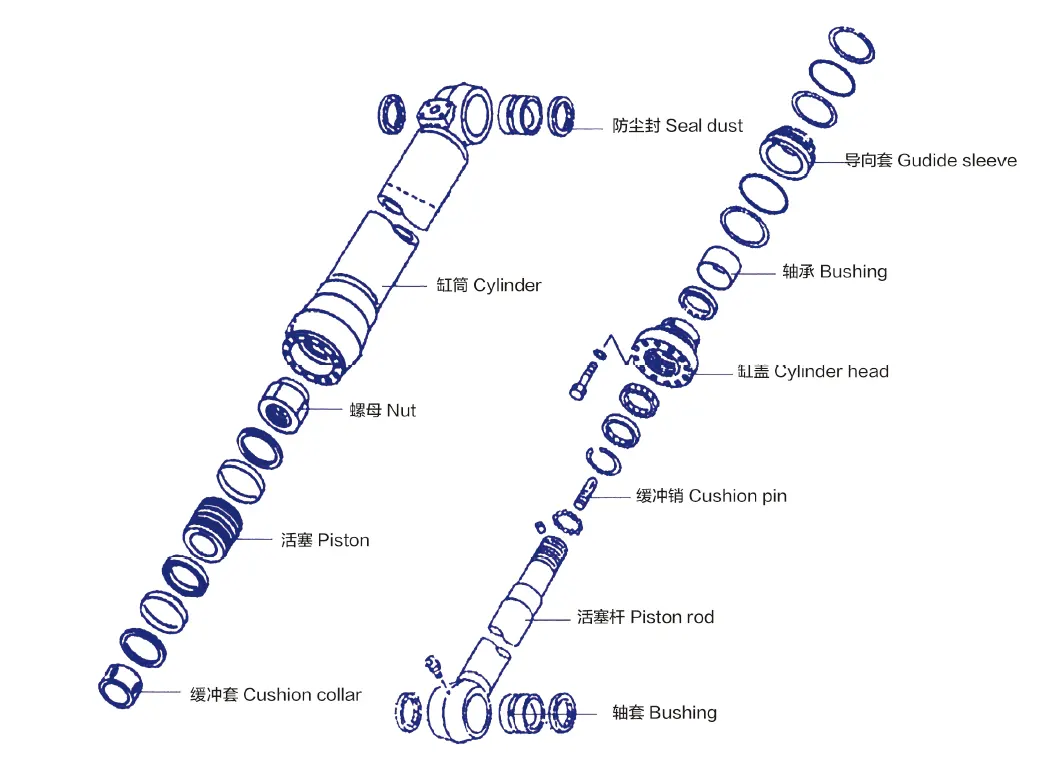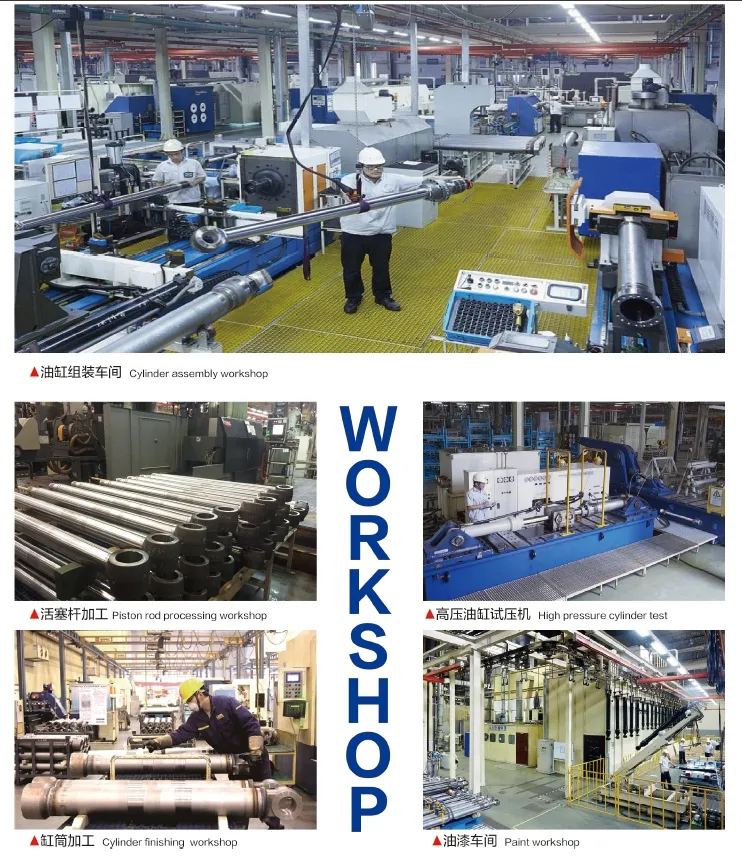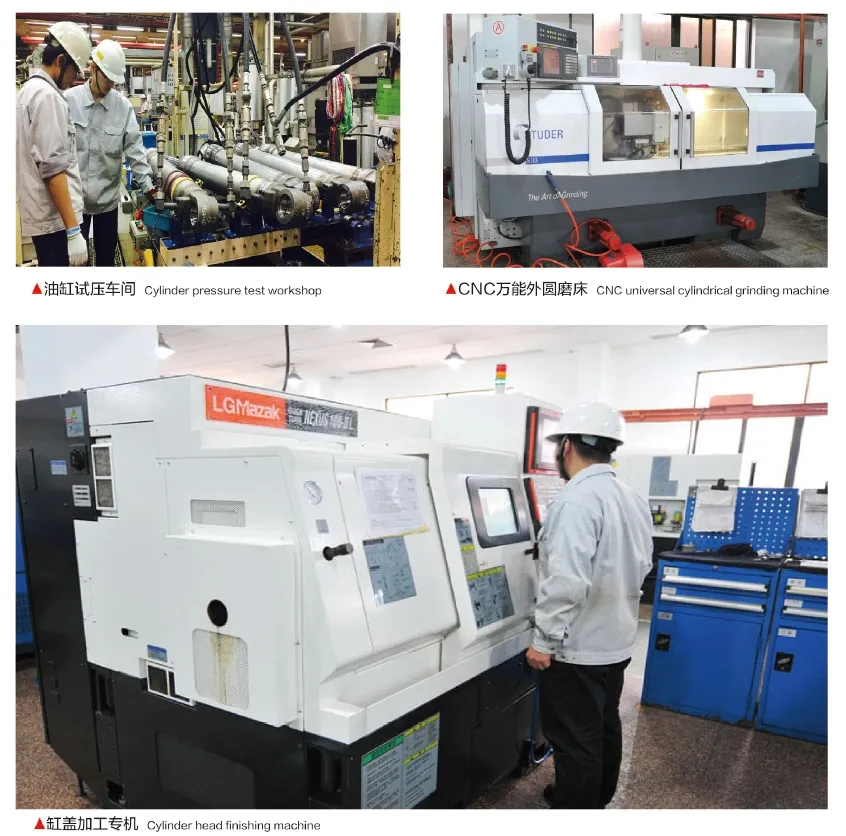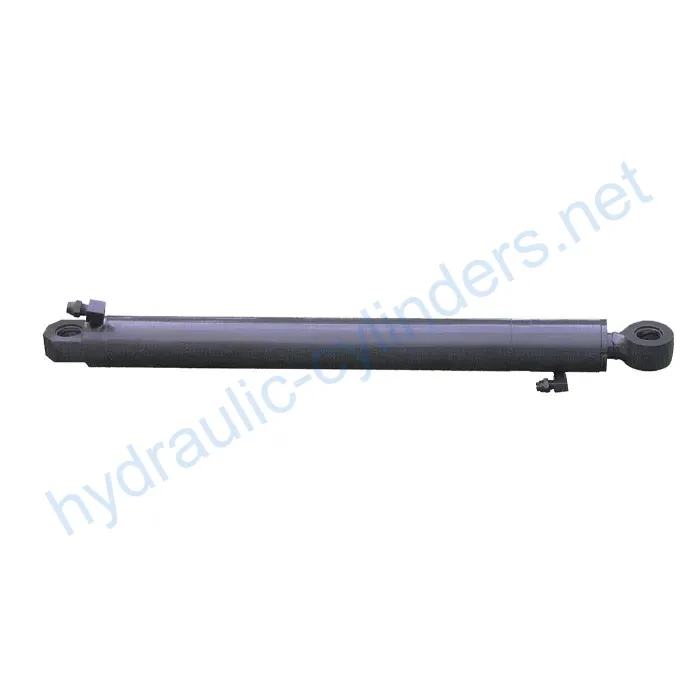Arm Cylinder For Jove JV235LC
Kot eden od proizvajalcev, dobaviteljev in izvoznikov hidravličnih cilindrov ponujamo hidravlične cilindre in številne druge izdelke.
Za podrobnosti se obrnite na nas.
Pošta:sales@hydraulic-cylinders.net
Proizvajalec, dobavitelj in izvoznik hidravličnih cilindrov.
Arm Cylinder for Jove JV235LC
Introduction
The arm cylinder is a specially designed hydraulic cylinder used to provide linear motion and power to various types of machinery arms, such as excavators, cranes, and robotic arms. It plays a crucial role in hydraulic systems, making it possible for additional tools or attachments to move and be controlled effectively. These cylinders not only enable smooth movement but also withstand heavy loads, ensuring efficient operation and reliability under various operating conditions.
Definition and Explanation
The arm cylinder, also known as a boom cylinder, is a type of hydraulic cylinder that provides power to the arm of a machine. It is usually made of high-strength materials, such as steel, and designed to withstand the high pressures and forces involved in hydraulic systems.
Hydraulic cylinders work by converting the energy from hydraulic fluid into linear force and motion. The arm cylinder is connected to the machine’s hydraulic system and receives pressure from the fluid when the operator moves the controls. This pressure forces the cylinder’s piston to move, which, in turn, moves the arm of the machine.
The arm cylinder is a vital component of many types of machinery, especially those used in construction, manufacturing, agriculture, mining, and logistics.

Features
The arm cylinder for Jove JV235LC has the following features:
-
High-Efficiency Transmission
The arm cylinder provides powerful linear motion and force, ensuring high efficiency in machine operations.
-
Precise Control
The arm cylinder can achieve precise motion control through the hydraulic system, making the operation of attached tools more flexible and accurate.
-
Durability
The arm cylinder is usually made of high-strength materials and has excellent wear and corrosion resistance, making it suitable for long-term use in harsh environments.
-
Multi-Functional Adaptability
The arm cylinder can be widely used in various types of machinery, such as excavators, cranes, and robotic arms, to suit different work requirements.
-
Easy Maintenance
The arm cylinder is designed for easy maintenance and replacement, making regular inspection and maintenance more convenient and reducing equipment downtime.
We can produce this product and offer an excellent replacement for hydraulic cylinders.

Applications
The arm cylinder for Jove JV235LC is widely used in different industries and applications, such as:
-
Construction Engineering
The arm cylinder is used in excavators and cranes to control the movement of buckets or booms for earthwork, material handling, and structural installation.
-
Manufacturing
The arm cylinder is used in automated production lines to control the movement of robotic arms for assembly, welding, and material handling operations, improving production efficiency and accuracy.
-
Agricultural Machinery
The arm cylinder is used in agricultural machinery such as harvesters and planters to control the movement of operation arms for seeding, fertilizing, and harvesting tasks.
-
Mining
The arm cylinder is used in mining equipment to control the movement of mining arms for ore mining and material handling.
-
Logistics and Transportation
The arm cylinder is used in forklifts and handling robots to control the movement of forks for material handling and stacking.
Design Considerations and Selection Criteria
The design and selection of arm cylinders are critical to ensuring their performance and reliability. The following design considerations and selection criteria should be taken into account:
-
Load Capacity
The arm cylinder must be capable of supporting the maximum load of the machine and its attachments. The cylinder’s load capacity should be calculated based on the machine’s weight, the weight of the attachment, and the load’s position.
-
Sealing
The arm cylinder must be well sealed to prevent hydraulic fluid leakage, which can lead to reduced performance and damage to other components. The cylinder should use various sealing elements such as piston seals and rod seals, made of durable materials such as polyurethane and nitrile rubber, to ensure long-lasting sealing performance.
-
Durability
The arm cylinder must withstand high pressures, forces, and harsh environments, and thus, the cylinder’s materials should be carefully selected. Steel and other high-strength materials are typically used to ensure durability and resistance to wear and corrosion.
-
Safety
The arm cylinder must be designed with safety in mind to prevent accidents and damage to the machine and personnel. The cylinder’s design should include safety features such as pressure relief valves, fail-safe mechanisms, and emergency stop buttons.
-
Maintenance
The arm cylinder’s design should consider ease of maintenance and replacement. The cylinder’s components should be easy to access, and the cylinder should be designed for easy disassembly and reassembly to reduce downtime and maintenance costs.

Sealing and Lubrication
The arm cylinder requires proper sealing and lubrication to ensure its performance and longevity. The following measures should be taken:
-
Sealing
The arm cylinder uses various sealing elements to prevent hydraulic fluid leakage, such as piston seals and rod seals. These seals should be made of durable materials, such as polyurethane and nitrile rubber, to withstand high pressures and wear.
-
Lubrication
The cylinder’s internal components must be well lubricated to reduce friction and wear. Hydraulic oil should be used to provide lubrication to the cylinder’s piston and other moving parts. The cylinder should be regularly lubricated with the recommended oil, and the oil level should be checked periodically.
Maintenance and Preventive Measures
Regular maintenance and preventive measures can help extend the arm cylinder’s life and prevent costly downtime. The following measures should be taken:
-
Inspection
The arm cylinder should be inspected regularly for signs of wear, damage, or leaks. Any damaged or worn components should be replaced promptly.
-
Cleaning
The arm cylinder should be kept clean and free of dirt and debris that can damage the cylinder’s seals and other components.
-
Lubrication
The cylinder’s recommended hydraulic oil level should be maintained at all times. Regular lubrication of the cylinder’s internal components should be carried out.
-
Preventive Replacement
Scheduled preventive replacement of the cylinder’s seals, piston, and other components can help prevent unexpected downtime and reduce maintenance costs.

Installation Guide
The following steps should be taken when installing the arm cylinder:
- Ensure that the machine’s hydraulic system is turned off and depressurized before installing the cylinder.
- Attach the cylinder to the machine’s arm or boom using the appropriate mounting hardware.
- Connect the cylinder’s hydraulic hoses to the machine’s hydraulic system, ensuring that the hoses are properly secured and tightened.
- Fill the cylinder with the recommended hydraulic oil, ensuring that the oil level is maintained at the recommended level.
- Perform a test of the cylinder’s operation to ensure that it is functioning correctly and smoothly.

Safety Considerations and Environmental Factors
When using the arm cylinder, the following safety considerations and environmental factors should be taken into account:
-
Safety
The arm cylinder can be dangerous if not handled properly. Operators should receive proper training on the machine’s controls and safety procedures. Safety features, such as pressure relief valves and emergency stop buttons, should be installed and tested regularly.
-
Environment
The arm cylinder’s operation can have environmental impacts, such as fluid leaks or noise pollution. Operators should take measures to prevent and mitigate these impacts, such as using biodegradable hydraulic fluid and installing noise-reducing devices.
Troubleshooting and Common Problems
The following are some common problems that can occur with the arm cylinder:
-
Fluid Leaks
Fluid leaks are a common problem with hydraulic cylinders. They can be caused by worn or damaged seals, loose connections, or a damaged cylinder.
-
Poor Performance
Poor performance can be caused by low hydraulic fluid levels, worn or damaged components, or a damaged cylinder.
-
Noise
Noise can be caused by loose connections, worn components, or a damaged cylinder.
-
Overheating
Overheating can be caused by low hydraulic fluid levels, a damaged cylinder, or a malfunctioning hydraulic pump.
To diagnose and solve these problems, the following measures can be taken:
-
Inspection
The cylinder should be inspected for signs of wear, damage, or leaks. Any damaged or worn components should be replaced promptly.
-
Cleaning
The cylinder should be kept clean and free of dirt and debris that can damage the cylinder’s seals and other components.
-
Lubrication
The cylinder’s recommended hydraulic oil level should be maintained at all times. Regular lubrication of the cylinder’s internal components should be carried out.
-
Replacement
Worn or damaged components should be promptly replaced to prevent further damage and downtime.


About Us
We are a professional manufacturer of replacement hydraulic cylinders, with a wide range of products that have made us one of the leading manufacturers and wholesale distributors of hydraulic cylinders in the domestic and international markets. We adhere to the principle of excellence in quality and rely on industrialized production management strategies in finely crafted manufacturing workshops to continuously improve our technology and production efficiency.
We have introduced high-end digital manufacturing equipment and professional testing systems, optimized our manufacturing platform continuously, and improved our product quality control process, enabling us with strong innovation capabilities. Our goal is to meet our customers’ diverse needs with high efficiency, accuracy, and high-quality principles.
We have a professional team that provides customized services, and we have obtained various international certifications, such as ISO9001:2015, CE, and SGS. Our production equipment and testing equipment are all advanced, including CNC machining centers, automatic welding machines, and dynamic balancing machines. We are committed to providing high-quality products and services to customers worldwide, and we offer excellent after-sales service to ensure customers’ satisfaction.
Our Services Include:
-
Professionalism
We have a professional team that provides customized services, and we can design, manufacture and test hydraulic cylinders according to customers’ specific requirements.
-
International Certification
We have obtained various international certifications, such as ISO9001:2015, CE, and SGS, to ensure product quality and compliance with international standards.
-
Customization
We can provide customized services for different types of hydraulic cylinders, including bore size, stroke length, mounting styles, and other specifications.
-
Production Equipment
Our production equipment and testing equipment are all advanced, including CNC machining centers, automatic welding machines, and dynamic balancing machines, to ensure the accuracy and efficiency of production.
-
After-Sales Service
We offer excellent after-sales service to ensure customers’ satisfaction, including technical support, installation guidance, and maintenance and repair services.
Author: lyl
Take a Tour of Our VR Factory:
Take a tour of our VR factory with the following
Hydraulic Cylinder Application:


